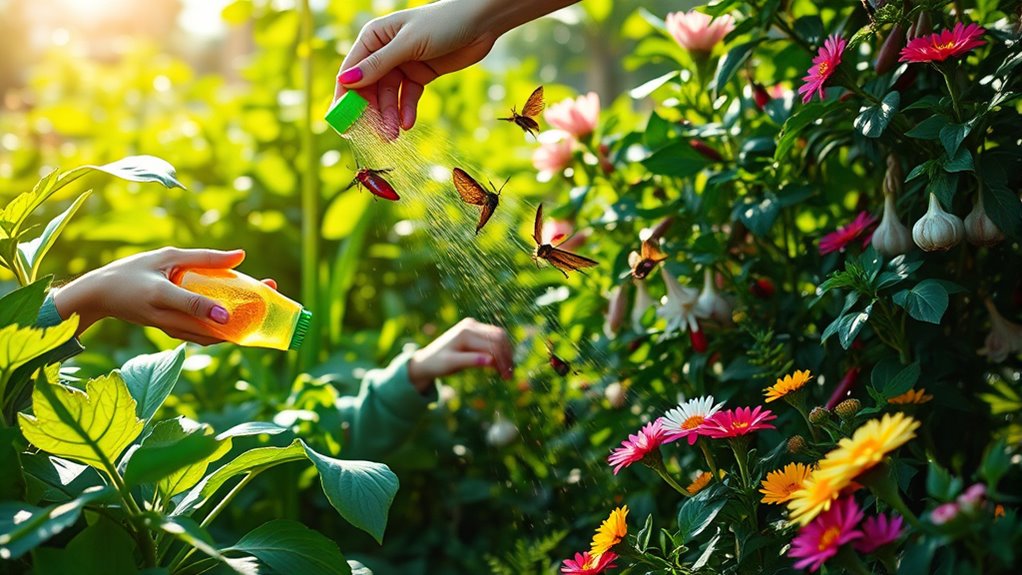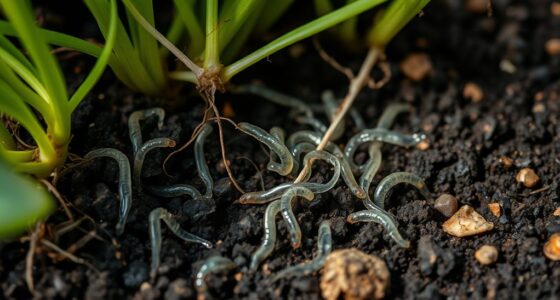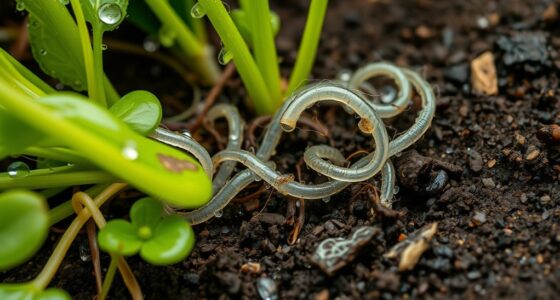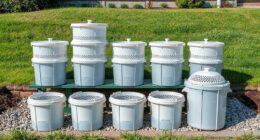To control pests organically, start by attracting beneficial insects like ladybugs and lacewings, which naturally prey on pests. Use natural repellents such as garlic spray, chili pepper solutions, and neem oil to create a pest deterrent barrier. Incorporate an integrated pest management approach, combining these methods to prevent pest build-up while protecting your plants. Regularly monitor your garden and adjust your tactics as needed. Keep exploring to discover more effective and eco-friendly pest control tips.
Key Takeaways
- Use beneficial insects like ladybugs and lacewings to naturally reduce pest populations.
- Apply natural repellents such as neem oil, garlic spray, or chili pepper solutions to deter pests.
- Implement integrated pest management by combining beneficial insects with natural repellents for comprehensive control.
- Monitor your garden regularly to identify pest issues early and respond promptly with targeted organic methods.
- Promote biodiversity by planting pest-repelling flowers like marigolds, dill, and fennel to attract beneficial insects.

Are you looking for safe and eco-friendly ways to protect your garden from pests? If so, harnessing the power of beneficial insects and natural repellents can be your best strategy. Beneficial insects, like ladybugs, lacewings, and predatory beetles, are natural allies that help keep pest populations in check without harmful chemicals. Introducing these insects into your garden creates a self-sustaining ecosystem where pests are naturally controlled. You can attract them by planting flowers like marigolds, dill, and fennel, which serve as food sources and habitats. Avoid using broad-spectrum insecticides, as they can kill beneficial insects along with pests, disrupting this delicate balance.
Natural repellents are another effective and eco-friendly tool. These are substances derived from plants or other natural sources that deter pests without harming your garden or the environment. For example, garlic spray, chili pepper solutions, and neem oil are popular natural repellents that pests dislike. Applying these repellents regularly creates a protective barrier around your plants, reducing pest damage. Since natural repellents break down quickly, you’ll need to reapply them often, especially after rain. This method not only minimizes chemical exposure but also keeps your garden safe for children, pets, and beneficial insects. Implementing integrated pest management strategies can further enhance your efforts by combining multiple control methods for sustainable results.
Combining beneficial insects with natural repellents enhances your pest control efforts. Beneficial insects often hunt down specific pests, while natural repellents prevent pests from settling in or feeding on your plants. For example, releasing ladybugs to combat aphids works well when you also spray a garlic-based repellent to discourage further infestations. This integrated approach reduces the need for chemical pesticides, which can harm your soil and water sources over time. Plus, it promotes a healthier garden environment, encouraging biodiversity and natural resilience.
To make these methods work effectively, you should monitor your garden regularly. Watch for signs of pests and beneficial insects alike. If you notice an increase in pests, introduce beneficial insects or apply natural repellents promptly. Over time, you’ll learn which plants attract beneficial insects and which repellents work best for your specific situation. Patience is key; organic pest control isn’t an instant fix, but it’s a sustainable way to keep your garden thriving without risking your health or harming the planet.
Frequently Asked Questions
Are Organic Pest Control Methods Safe for Pets?
You’re wondering if organic pest control methods are safe for pets. Generally, they are, since they avoid harsh chemicals, reducing chemical concerns and promoting pet safety. However, always read labels carefully and follow instructions, as some natural ingredients can still cause irritation or allergic reactions. When used properly, organic methods are a safer alternative, giving you peace of mind while protecting your home and your furry friends from pests.
How Long Does It Take to See Results?
Ever wonder if your efforts will bear fruit? The natural timing and effectiveness delay of organic pest control methods vary, but you typically see results within a few days to a couple of weeks. Patience is key—think of it as nurturing a garden; pests don’t vanish overnight. Consistency boosts effectiveness, so keep applying treatments as directed, and you’ll notice a decline in pests, proving these methods truly work over time.
Can Organic Methods Eliminate All Pest Types?
You wonder if organic methods can eliminate all pest types. While they’re effective against many pests, they may not handle severe infestations like chemical pesticides or synthetic chemicals can. Organic approaches target pests naturally, but some stubborn or large pest populations might require additional strategies. You should combine organic methods with good prevention practices, understanding that they’re safer but may take longer and might not completely eradicate every pest type.
Are Organic Pest Controls Cost-Effective Long-Term?
Imagine you’re back in the days of herbal remedies—organic pest control can be just as effective today. It’s generally cost-effective long-term because of lower chemical expenses and fewer health risks. When you do a cost comparison, you’ll find that investing in organic methods leads to significant long-term savings by reducing the need for frequent treatments. Plus, you’re protecting your environment, making it a smart, sustainable choice for your pest management needs.
Do Organic Methods Require Professional Application?
You can definitely use DIY techniques for organic pest control without needing a professional, especially since many organic methods align with pesticide restrictions. These techniques often involve simple, safe ingredients like neem oil or insecticidal soap, making them easy to apply yourself. By following instructions carefully, you can effectively manage pests while staying within organic guidelines, saving money, and avoiding the need for professional help.
Conclusion
By trying these organic pest control methods, you’re not only protecting your garden naturally but also supporting a healthier environment. Did you know that organic methods can reduce pesticide use by up to 90%? That’s a huge step toward safer, sustainable gardening. So, give these techniques a shot—your plants, the planet, and your peace of mind will thank you. Embrace organic solutions and enjoy a thriving, chemical-free garden all season long.









